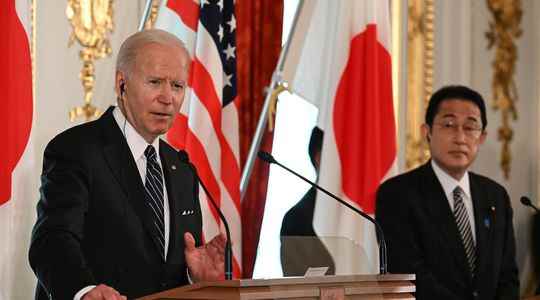This is the second such commitment Joe Biden has made in eight months. In October 2021, the Democratic leader had caused trouble by claiming that Washington had a “commitment” to defend Taiwan militarily in the event of a Chinese attack. This Monday, May 23, the American president considered that China “flirts with danger” and reiterated his commitment, warning that the United States would defend Taiwan militarily if Beijing invaded the autonomous island.
“That’s the commitment we made,” Joe Biden said when asked at a press conference in Tokyo if the United States would intervene militarily in the event of a Chinese attempt to seize Taiwan by strength. “We agreed with the one China policy, we signed it (…) but the idea that (Taiwan) can be taken by force is simply not appropriate”, a– he specified. Beijing reacted quickly. “We urge the United States (…) to avoid sending the wrong signals to the independence forces” in Taiwan, said Wang Wenbin, a spokesman for the Ministry of Foreign Affairs. According to Jean-Eric Branaa, lecturer at Paris-II-Panthéon-Assas University and specialist in the United States, Joe Biden does not break with Washington’s position on the autonomous island.
L’Express: How to interpret Joe Biden’s words? Are they consistent with US policy on Taiwan?
Jean-Eric Branaa: Joe Biden is a man for whom words matter a lot. He recalled the existence of a single China and repeated that this poses no problem for the White House. His statement is a continuation. There is therefore no change in policy, or gaffe on his part, whereas in October, his position had been analyzed quite surprisingly as a blunder. But in the Biden administration, no one corrects the president because the Constitution gives him the freedom to decide foreign policy.
In reality, his words should be understood as a solemn warning addressed to China. It’s a way of saying: “if you want the status quo, you too must respect the status quo, it’s give and take.” The message is clear: if China crosses the red line using force, then the United States will intervene. Interestingly, the Chinese did not respond to the issue of aggression; they say this declaration can give fuel to the separatists in Taiwan.
The American president does not want an autocracy to be able to seize another territory by force, against the will of the inhabitants. The engine of Joe Biden is the defense of democracy in the world. All of his speeches, whether during his campaign, during his inauguration speech, at the democracy conference or during his State of the Union address have been devoted to this subject.
In general, the American president wants to keep the status quo. He doesn’t think the world is working too badly with the current balance, but he’s on a crest. The problem with a ridge line is that you can slip, while the world is not safe.
In your opinion, Joe Biden is therefore not deviating from the Taiwan relations act? (Editor’s note: a law adopted in 1979 by the American Congress, which governs American policy in this area, Washington committing to recognize only one China, while supplying weapons to Taiwan for its self-defense)
Joe Biden is clarifying a point that was not present in the Taiwan relations act, namely the question of Washington’s military intervention on this island in the event of an invasion by China. It is an ambiguous law because it says nothing on this subject. Since its adoption, it is therefore the interpretation that takes precedence and Joe Biden said to himself that it was up to him to interpret as president. It was important for the Americans to remind Beijing of this act recognizing a single China, to tell the Chinese that they have not changed their position and that they do not intend to be belligerent.
The Chinese heard the message very well and moreover they did not respond head-on, unlike when Donald Trump was president, when they responded tit for tat.
A new economic partnership in Asia-Pacific led by the United States was announced this Monday in Tokyo by Joe Biden, the IPEF (Indo-Pacific Economic Framework), with 13 first participating countries. Note the absence of Taiwan among the participating countries. How to interpret it?
In terms of diplomacy, one pawn is advanced and another is retreated, that is what is happening. Joe Biden advances his pawns very quietly, he does exactly what he announced. The challenge of his first trip to Asia as president was not to get closer to Taiwan but to strengthen ties with South Korea and Japan, which has been done since Sunday May 22.
It is also important for him to bring India (one of the 13 member nations of this partnership) back into the fold of the United States. If it works, the Aukus (Editor’s note: the tripartite military alliance formed by Australia, the United States and the United Kingdom which aims to counter Chinese expansionism in the Indo-Pacific) will mean something. The world is rebuilding itself in the Indo-Pacific. While we are all watching in Ukraine, the American president has his eyes turned towards the Indo-Pacific zone.
